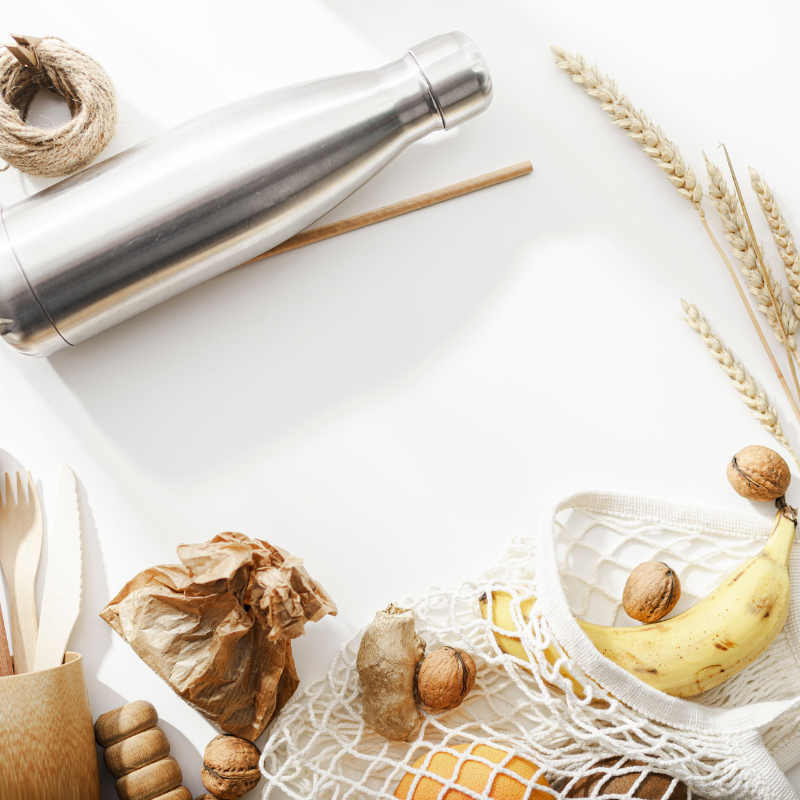
-
Posted on
04/07/2022
Reduce your plastic footprint

Plastic-free July is a global initiative to encourage people to use less plastic. It serves to remind us just how pervasive plastic has become in our everyday lives, from the wrap our fruit is packaged in, to make-up, toothpaste, chewing gum, and even some of our coffee filters.
Plastic waste is a problem. It is estimated that over 250,000 tonnes of plastic waste are dumped in our landfills each year. It is hard to break down, and when it does it releases toxic and carcinogenic compounds into the soil and air. It clogs our landfills. Pollutes our seas and has even been discovered in our blood.
Unfortunately, every single piece of plastic that has ever been created still exists.
Against the enormity of the problem, it seems almost futile to make a change. But slight changes in the way we live multiplied by millions of people can have a significant impact.
What can you do to reduce your plastic footprint?
1. The first place to start is to evaluate the scale of your relationship with plastic. rePurpose enables you to quickly evaluate your plastic footprint and highlights the products you consume that could be reduced or switched out for non-plastic alternatives. For example, can you reduce the number of takeaway or ready meals you eat per week or find an alternative brand of mascara that does not contain microplastic parts?
2. Be more aware of the ingredients in your everyday purchases. Apps like codecheck make this easy. You simply scan the barcode, check the ingredients, and find alternative products based on the preferences you have selected. One of these ratings is for plastic.
3. Avoid single-use plastic items. Use a water bottle instead of buying water. Use a reusable coffee cup (find out how to redeem a free one here) instead of buying a disposable cup. Or better yet, drink it in a cup and take a few minutes to stop and enjoy the world around you. Make your lunch or choose a lunch option that does not come packaged in plastic. Avoid buying snacks that are individually wrapped, it is a great excuse to encourage home baking or purchasing a tin of biscuits.
4. Avoid plastic cutlery. It is simple to replace it with reusable items in your canteen.
5. In the UK, half of all plastic waste is generated from plastic packaging. Look at your supplies and how they are packaged. Do you think it is excessive or could be improved? If so, talk to your suppliers and together find a solution.
6. And recycle carefully. Recycling plastic is much better than burning it in an incinerator. But there is a need for some guidelines. We are all familiar with the triangular symbol on packaging that means recycle, unfortunately, it does not mean that it can be recycled easily. The numbers (1-7) within the triangle indicate the grade of plastic and how easy it is to recycle. In Auckland, the Council recycles all plastic but not all plastic is recycled in the kerbside recycling bins.
Print out the plastic resin identification codes and display them prominently next to your recycling bins. Those numbered 1,2 and 5 are easy to recycle whilst plastic numbered 3, 4, 6, and 7 are much harder to recycle and need to be collected and recycled by a specialised recycler.
7. Attend a free Harbour Grounds Plastic Free July workshop as a fun way to educate yourself more. We have DIY Beeswax Wraps or Creative Cooking with Most Wasted Foods. Find out more and register here.
Start reducing your plastic consumption this July and help save energy, reduce greenhouse gases and pollution, and save our rivers, seas, and oceans.
Harbour Grounds Green Team
Did you know that Harbour Grounds have a green team? Each quarter, representatives from business at Harbour Grounds connect to hear from a speaker, connect, share kai and discuss sustainability initiatives. Contact yourteam@harbourgrounds.co.nz if you would like to join or hear more.





